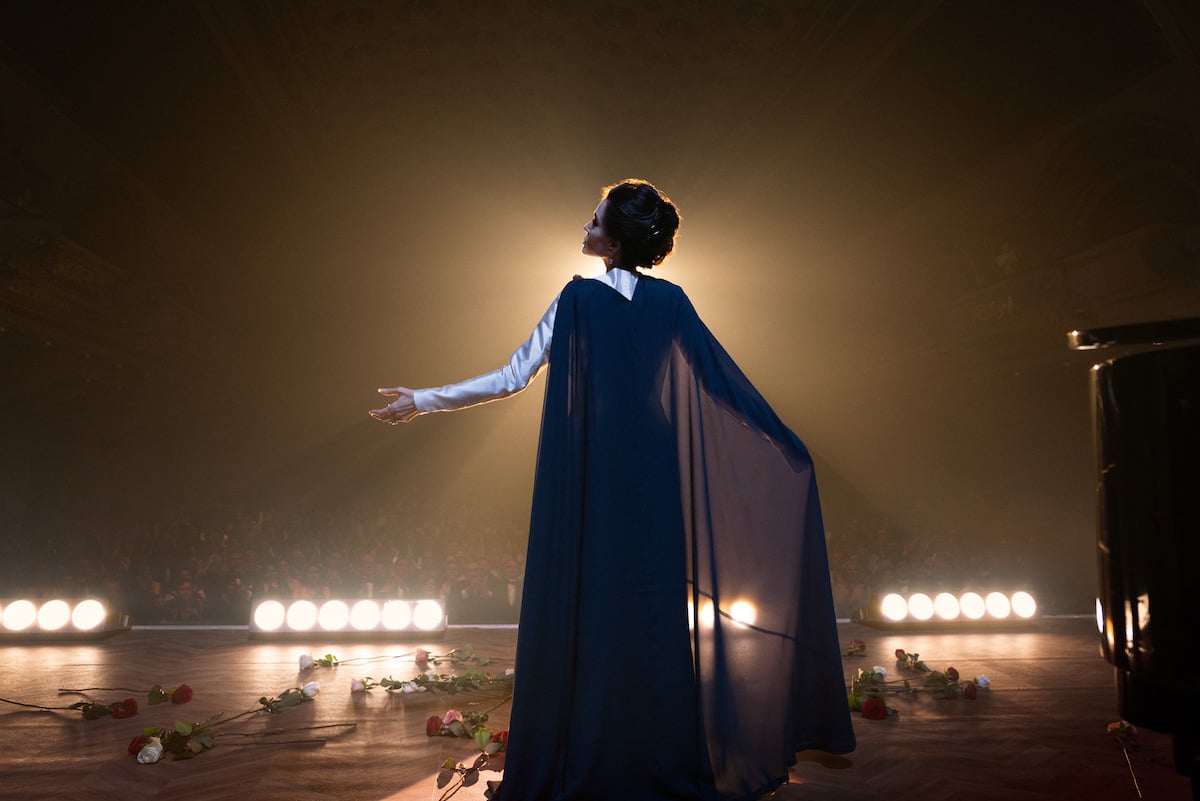
We first meet Pablo Larraín’s Maria Callas on her literal deathbed. It is an ornate one, though comparatively small in her sprawling, sumptuous Parisian apartment; Callas herself (Angelina Jolie) is shrunken and struggling beneath the covers. It is 1977, and the legendary soprano singer known as La Divina—‘the divine one’—has been living in isolation for four years, fuelled by a bespoke cocktail of prescription pills, venturing out infrequently.
Requesting “an appointment with a hairdresser that doesn’t speak” and reserving a table somewhere “the waiters know who I am,” Maria curates her interactions meticulously. “I come to restaurants to be adored,” she admits. Throughout the film, she offers many such asides to Mandrax (Kodi Smit-McPhee), a TV journalist named in the film for one of the brands of sedative she favours, as well as a figment of her imagination. Sensing that she is approaching the end of her life, Maria is attempting to autobiographize it.
We flash back to the black and white days of her first marriage, watching her affections become overwhelmed by the lavish impulses of roguish shipping magnate Aristotle Onassis (Haluk Bilginer), whose charm offensive dissipates as he spurns Maria for Jackie Kennedy (notably Larraín’s first biopic muse in his unofficial trilogy of “misunderstood” female icons of the 20th century, along with Princess Diana). “No one cares if she can sing,” Onassis tells Maria towards the end of their relationship, as they look on at Marilyn Monroe’s infamous birthday serenade. “Just like no one cares about your body.” The cad!
Another recent film about a fading female star facing the conflict between a deteriorated present and a younger, more radiant self is Coralie Fargeat’s The Substance. Yet unlike Fargeat’s more fictionally-rooted film, Larraín’s biopic presents the tension between Maria’s then and now with a great deal of empathy and attention to detail, and feels all the richer for it. With Onassis, she says, her youth felt as if it was within reach: “I could be a girl again.”
But even in the wake of the tycoon’s death, Maria is not alone. Made up of Bruna (Alba Rohrwacher), a soft-spoken housekeeper who “can cook anything”, and Ferruccio (Pierfrancersco Favino), the devoted butler who diligently moves around his capricious madam’s grand piano, the dowager’s house staff act as her advisors and confidantes, caring for her beloved miniature poodles while keeping a wary eye on her spiralling drug consumption. For the most part, Maria is unable to accept their kindness at this point in her life. “Do you know why I hate you?” she asks Ferruccio, her elegant, European tone imbued with quiet venom. “I fall into a river, and you always fish me out.”
In the present day, Maria’s voice isn’t what it used to be. It may never be the same again, but the singer works doggedly to return her vocals to the height of their powers, rehearsing with a dedicated pianist; reminiscing over triumphant but painful memories of her ability before its diminishment. In these flashback scenes, Jolie’s singing has been digitally combined with Maria Callas’ actual vocals. Unfortunately, the overall effect is closer to a lip sync performance than a veracious musical outpouring. It feels almost cruel that Jolie’s own vocals—the product of a six-month training schedule as well as lessons in Italian—are emphasised in Maria’s laborious present-day sequences.
While its highlights include exquisite frames composed by cinematographer (and longtime Larraín collaborator) Edward Lachman, as well as opulent costume pieces from designer Massimo Cantini Parrini, the film has a penchant for the elaborate and unsubtle. For instance, Maria’s encounter with a sleazy, caricaturish music journalist who sneaks into her rehearsal and terrorises her about her artistic shortcomings. This ostensibly represents the vitriolic press that Callas became subject to towards the end of her life, but it comes across a bit too pat to be genuinely affecting.
Though Larraín has said he didn’t want to “make a dark movie about a tragic situation,” the gloom inherent to Maria feels in many ways unavoidable. If Larraín meant for the film to be a “celebration” of the singer it arguably becomes too mired in its protagonist’s tragedies to allow for such a reading. But Callas’ life was an extraordinary one, from the time she spent living in poverty in Nazi-occupied Athens to her first, electric La Scala performance and the ritzy yacht parties of her early courtship with Onassis—a compelling, richly-rendered story well worth spending a couple of hours on.





